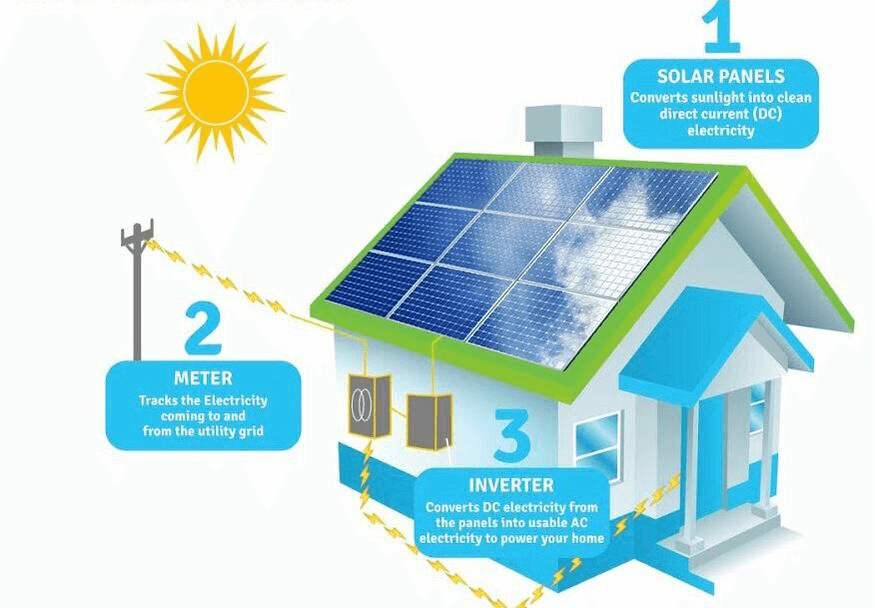Why Simply Solar Illinois is the Smart Choice for Renewable Energy
Why Simply Solar Illinois is the Smart Choice for Renewable Energy
Blog Article
Solar Power 101: A Beginner's Overview to Sustainable Energy Solutions
As the globe increasingly shifts in the direction of lasting energy solutions, comprehending the fundamentals of solar power comes to be vital for both individuals and services. By checking out the advantages of solar innovation, together with the financial incentives and setup processes, one can gain a more clear point of view on how to successfully integrate this renewable source right into their energy technique.
Recognizing Solar Power
At its core, recognizing solar power involves comprehending the fundamental concepts of how sunlight can be transformed into useful electricity. Solar power is acquired from the sun's radiation, which can be harnessed through numerous innovations. The primary mechanism for this conversion is the photovoltaic or pv impact. This sensation happens when sunlight strikes semiconductor products, usually silicon-based, within solar batteries. The energy from the sunshine thrills electrons in the semiconductor, permitting them to move openly and generate straight current (DC) electrical energy.

Recognizing solar power likewise includes acknowledging its ecological benefits. By making use of sunlight, we can minimize greenhouse gas discharges and decrease air contamination, adding to an extra lasting future. The developments in modern technology and effectiveness of planetary systems remain to improve their practicality, making solar power a significantly attractive alternative for global energy demands.
Types of Solar Power Systems
Different kinds of solar power systems are commonly employed to harness solar power for electrical energy generation. The primary categories consist of solar (PV) systems, focusing solar power (CSP) systems, and solar thermal systems.
Photovoltaic systems utilize photovoltaic panels made up of silicon cells that convert sunlight directly into power. These systems are flexible and can be mounted on roofs, ground installs, or incorporated into structure products.
Focusing Solar Power systems, on the other hand, utilize mirrors or lenses to concentrate sunlight onto a small area, producing warmth that drives a heavy steam turbine to produce electrical power - Simply Solar Illinois. CSP systems are typically released in large-scale power plants and call for direct sunshine, making them less ideal for over cast areas

Each type of solar power system has its one-of-a-kind features, applications, and suitability relying on geographic place, power demands, and budget plan, making it necessary to examine choices based upon specific situations. - Simply Solar Illinois

Advantages of Solar Energy
Using solar energy through different systems not only offers a sustainable way to generate electricity however likewise provides a wide range of benefits. One of the most substantial advantages is the decrease in greenhouse gas discharges, adding to a cleaner environment and combating climate adjustment. Solar power is renewable, meaning it is endless and available as long as the sun radiates, unlike nonrenewable fuel sources, which important link are limited and depleting.
In addition, solar energy can lead to significant cost savings over time. Property owners and services can minimize their electrical power costs dramatically, and in most cases, they may gain credit scores for excess power created via net metering. In addition, the solar market develops jobs, from making to setup, promoting neighborhood economic climates.
An additional engaging benefit is energy self-reliance. By producing their own electrical energy, people and communities can lower reliance on exterior energy sources, improving durability against changing power rates and supply disruptions. Solar power systems require very little maintenance, making them a practical choice for sustainable energy generation.
Installation Refine Review
The setup procedure for solar power systems commonly involves numerous key actions that guarantee efficient integration into a residential or commercial property. Initially, a thorough site evaluation is conducted to evaluate the roof covering's alignment, shading, and architectural integrity, which are essential to optimizing solar panel efficiency. Following this analysis, the layout phase starts, where a customized solar power system is configured based on the property owner's energy demands and preferences.
As soon as the design is settled, the needed licenses and approvals are obtained from neighborhood authorities, making sure conformity with policies. The real installment involves mounting the photovoltaic panels on the roof or ground, linking directory them to an inverter, and incorporating the system with the building's electrical arrangement. This stage might likewise entail mounting battery storage systems, depending upon the design.
After setup, a detailed evaluation is performed to verify the system's capability and security. The system is appointed, and property owners are educated on its procedure and maintenance. With the setup complete, the solar energy system can begin producing renewable resource, contributing to sustainability and lowering energy costs. This organized technique guarantees that solar systems are both effective and trustworthy, maximizing their long-term advantages.
Financial Rewards and Cost Savings
Discovering the economic motivations and financial savings linked with solar energy systems next page can considerably boost the appeal of making the switch to eco-friendly energy. One of the most significant rewards is the federal solar tax credit score, which enables house owners to deduct a percentage of their solar system installment expenses from their federal taxes.
Along with tax credit scores, numerous states use discounts that can even more lower ahead of time expenditures. Some utility firms also provide performance-based rewards, rewarding solar power manufacturing over time. Funding choices, such as solar loans and leases, allow consumers to mount systems with little to no down settlement, making solar energy much more available.

Lasting financial savings are another crucial aspect. By producing their very own power, house owners can dramatically reduce and even remove their monthly power expenses. Additionally, solar systems can boost building worths, offering a solid return on financial investment. In general, the mix of motivations and savings makes solar energy a financially attractive choice for lots of households.
Verdict
In conclusion, solar power stands for a crucial component of lasting energy solutions, offering a pathway toward minimized carbon impacts and boosted environmental security. Ultimately, the transition to solar power not just fosters environmental responsibility however likewise advertises economic financial savings and power freedom.
Report this page